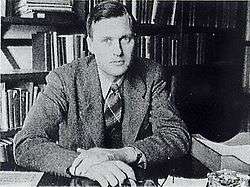Robert Richardson Sears
| Robert Richardson Sears | |
|---|---|
|
Photograph of Sears from the 1940s | |
| Born |
August 31, 1908[1] Palo Alto, California[1] |
| Died |
May 22, 1989 (aged 80)[2] Menlo Park, California[2] |
| Citizenship | American |
| Fields | Child Psychology |
| Institutions | Stanford University |
| Influences | Clark Leonard Hull |
Robert Richardson Sears (/sɪərz/; August 31, 1908[1] – May 22, 1989[2]) was an eminent American psychologist who specialized in child psychology. He was for many years the head of the psychology department at Stanford and later dean of the School of Humanities and Sciences there,[2] continued the long-term I.Q. studies of Lewis Madison Terman at Stanford,[3] and authored many pivotal papers and books on various aspects of psychology.
Early life
He was born in Palo Alto, California to Jesse Brundage Sears, a professor at Stanford University, and Stella Louise (Richardson) Sears.[3] As a child Sears attended Palo Alto Union High School.[4] He received his Artium Baccalaureus degree from Stanford in 1929[3] and a Ph. D. from Yale University in 1932.[2] He was married on June 25, 1932 to Pauline Kirkpatrick Snedden,[3] who co-authored a book with him and with whom he shared an award for achievement in psychology late in their lives.[5]
Professional life
After leaving Yale, Sears was first an instructor in psychology at the University of Illinois from 1932 to 1936 and at the same time was a clinical psychologist at the Institute for Juvenile Research there. He returned to Yale as an associate professor of psychology in 1936 and remained there until 1942.[3]
From 1942 until 1949 he was director of the Iowa Child Welfare Research Station at the University of Iowa.[6] where he worked with such luminaries as Kurt Zadek Lewin From 1949 until 1953 he directed the Laboratory of Human Development at the Harvard Graduate School of Education.[6]
In 1953 Sears returned to Stanford where he served as chair of the Psychology department until 1961, Dean of the School of Humanities and Sciences from 1961 to 1970, and David Starr Jordan Professor of Psychology from 1970 until 1975.[3]
Sears was president of the American Psychological Association in 1951.[3]
Select works
- Frustration and aggression (1939, with John Dollard, Leonard William Doob, Neal Elgar Miller, Orval Hobart Mowrer, ISBN 0-313-22201-0)
- Survey of objective studies of psychoanalytic concepts (1943, Social Science Research Council, ISBN 0-313-21249-X)
- Patterns of child rearing (1957, Eleanor E. Maccoby, Harry Levin, Edgar L. Lowell, Pauline Snedden Sears, and John W. M. Whiting, Jean Berwick, ISBN 0-8047-0916-5)
- Identification and child rearing (1966, Lucy Rau Ferguson, Ram Dass, ISBN 0-422-98500-7)
- Seven Ages of Man (June 1973, S. Shirley Feldman, ISBN 978-0-913232-06-4)
- Your ancients revisited: A history of child development (1975, ISBN 978-0-226-33154-6)
References
- 1 2 3 No Authorship Indicated (1979), "Robert R. Sears: Distinguished Scientific Contribution Awards for 1975.", American Psychologist, Washington, D.C.: American Psychological Association, 31 (1): 59–64, doi:10.1037/h0078460, ISSN 0003-066X
- 1 2 3 4 5 Narvaez, Alfonso A. (May 26, 1989), "Dr. Robert R. Sears, 80, Is Dead; Child Psychologist and Educator", The New York Times
- 1 2 3 4 5 6 7 "Sears, Robert Richardson", Biographical Dictionary of Modern American Educators, Westport, Connecticut: Greenwood Publishing Group, 1997, p. 285, ISBN 978-0-313-29133-3, OCLC 36430647.
- ↑ Rothe, Anna Herthe; Lohr, Evelyn (1952), Current Biography Yearbook: Who's News and Why, New York: H. W. Wilson Company, p. 522, ISSN 0084-9499
- ↑ Russo, Nancy Felipe; Denmark, Florence L. (January 1987), "Contributions of Women to Psychology", Annual Review of Psychology, Palo Alto, California: Annual Reviews, 38: 279–298, doi:10.1146/annurev.ps.38.020187.001431, ISSN 0066-4308
- 1 2 United States Congress Senate Committee on Finance (1969), Tax Reform Act of 1969: Hearings, Ninety-first Congress, First Session, on H.R. 13270: to Reform the Income Tax Laws. Sept. 4-Oct. 22, 1969, Washington, D.C.: G. P. O., p. 5592, LCCN 73603875, OCLC 29021
| Educational offices | ||
|---|---|---|
| Preceded by Joy Paul Guilford |
60th President of the American Psychological Association 1951-52 |
Succeeded by Joseph McVicker Hunt |
